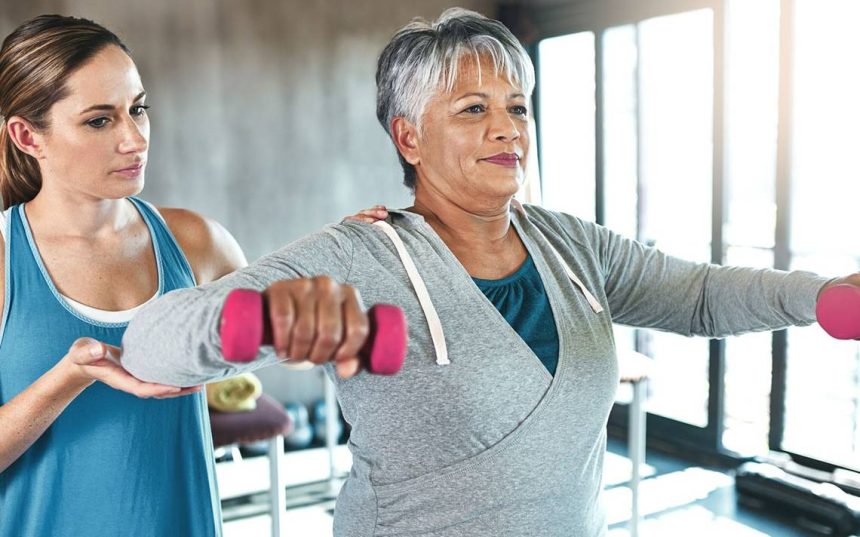For many Americans, staying fit is already a daunting task, but for women reaching the age of 50, maintaining fitness can feel like an even greater challenge. Despite the abundance of weight loss programs, exercise equipment, and fitness routines available today, statistics highlight the overall lack of fitness in our country.
However, there are straightforward and impactful methods to maintain fitness beyond the age of 50. These five tips offer simple yet effective ways to achieve and sustain fitness as you enter and progress through your 50s and beyond.
Lift Weights
Strength training, particularly through weight lifting, emerges as a highly effective method for older women to uphold their overall fitness and counteract gradual fat accumulation. Research indicates that women, even in their 70s, can achieve notable muscle development by engaging in weight training sessions 2 to 3 times weekly, highlighting the adaptability and benefits of this exercise regimen across various age groups.
Walk Regularly
Walking consistently proves to be a reliable means of enhancing cardiovascular health, weight management, and mood regulation among individuals who incorporate it into their regular exercise regimen. While various aerobic activities such as cycling, jogging, and swimming contribute to reducing body fat levels and enhancing overall body tone, walking offers distinct advantages for individuals aged 50 and above.
For older exercisers, walking presents several unique benefits. It carries a low risk of injury, necessitates minimal equipment, can be pursued independently or in a group setting, and remains easily accessible during travel. Moreover, walking contributes to the promotion of joint and bone health.
A significant advantage of walking is its versatility. Engaging in walking routines for everyday tasks, pet exercise, social interactions, or exposure to fresh air adds further value to its fitness benefits. By combining walking with weight training, individuals can establish a straightforward yet highly effective approach to achieving and maintaining fitness beyond the age of 50.
Incorporate High-Intensity Interval Training (HIIT)
Interval training is an efficient method for enhancing overall fitness, offering rapid results while posing a challenge. Despite its effectiveness, interval training requires a cautious approach to minimize the risk of injury.
To reap the benefits of interval training while reducing potential risks, it’s advisable to start gradually and cease the activity when you feel breathless or fatigued. For instance, during a walk, you can elevate your pace for 30 seconds before returning to your normal speed. Repeat this 30-second burst every 5 minutes, aiming for a total of five bursts.
Over time, you may feel inclined to increase the intensity of your intervals, perhaps transitioning to a light jog during the 30-second bursts. The flexibility of interval training allows you to adjust the effort and repetitions according to your fitness level and goals. If you’re already in excellent shape, incorporating high-intensity interval training can further elevate your workout.
However, it’s crucial to remain attentive to warning signs of overexertion when starting interval training. Listening to your body and recognizing its limits will help ensure a safe and effective workout experience.
Perform Core Exercises
As we age and adopt a more sedentary lifestyle, core strength tends to decline, often becoming one of the initial casualties. Diminished core strength can trigger a cascade of physical discomforts stemming from poor body mechanics and alignment, resulting in ailments such as backaches, hip discomfort, knee issues, and neck strain.
It’s important to recognize that the core encompasses more than just the abdominal muscles, emphasizing the need for a comprehensive core strength regimen.
Dedicating a brief 20-minute core workout session 3 to 4 times per week can effectively maintain core strength and stability. Additionally, integrating simple body-weight exercises into your routine can engage the core muscles by necessitating stabilization of the body. These exercises offer valuable support in preserving core muscle integrity and functionality.
Eat Enough Protein
A significant number of older women face challenges in obtaining sufficient protein to sustain muscle mass. Protein serves as the primary building block for the body, necessitating regular replenishment due to its non-storage nature. Proteins can be categorized as complete, containing all 8 essential amino acids, or incomplete, lacking some essential amino acids.
Complete proteins are predominantly sourced from animal products such as meat, fish, and eggs, whereas incomplete proteins are commonly found in vegetables, fruits, and nuts.
Vegan and strict vegetarian individuals may encounter difficulties in acquiring adequate protein intake unless they carefully combine various food sources. Insufficient protein intake can hinder muscle building and maintenance, particularly for vegans, underscoring the importance of understanding optimal protein consumption.
Achieving and maintaining fitness beyond the age of 50 is feasible with consistent physical activity and a nuanced understanding of nutritional requirements to optimize health and well-being.










